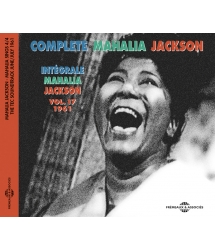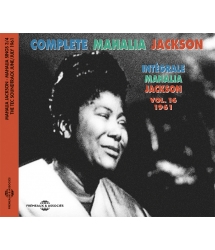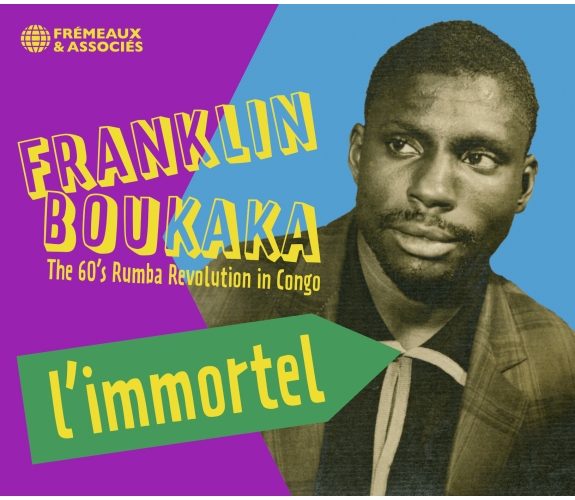- Our Catalog
- Philosophy
- Philosophers of the 20th century and today
- History of Philosophy (PUF)
- Counter-History and Brief Encyclopedia by Michel Onfray
- The philosophical work explained by Luc Ferry
- Ancient thought
- Thinkers of yesterday as seen by the philosophers of today
- Historical philosophical texts interpreted by great actors
- History
- Books (in French)
- Social science
- Historical words
- Audiobooks & Literature
- Our Catalog
- Jazz
- Blues
- Rock - Country - Cajun
- French song
- World music
- Africa
- France
- Québec / Canada
- Hawaï
- West Indies
- Caribbean
- Cuba & Afro-cubain
- Mexico
- South America
- Tango
- Brazil
- Tzigane / Gypsy
- Fado / Portugal
- Flamenco / Spain
- Yiddish / Israel
- China
- Tibet / Nepal
- Asia
- Indian Ocean / Madagascar
- Japan
- Indonesia
- Oceania
- India
- Bangladesh
- USSR / Communist songs
- World music / Miscellaneous
- Classical music
- Composers - Movie Soundtracks
- Sounds of nature
- Our Catalog
- Youth
- Philosophy
- News
- How to order ?
- Receive the catalog
- Manifesto
- Dictionnary











- Our Catalog
- Philosophy
- Philosophers of the 20th century and today
- History of Philosophy (PUF)
- Counter-History and Brief Encyclopedia by Michel Onfray
- The philosophical work explained by Luc Ferry
- Ancient thought
- Thinkers of yesterday as seen by the philosophers of today
- Historical philosophical texts interpreted by great actors
- History
- Books (in French)
- Social science
- Historical words
- Audiobooks & Literature
- Our Catalog
- Jazz
- Blues
- Rock - Country - Cajun
- French song
- World music
- Africa
- France
- Québec / Canada
- Hawaï
- West Indies
- Caribbean
- Cuba & Afro-cubain
- Mexico
- South America
- Tango
- Brazil
- Tzigane / Gypsy
- Fado / Portugal
- Flamenco / Spain
- Yiddish / Israel
- China
- Tibet / Nepal
- Asia
- Indian Ocean / Madagascar
- Japan
- Indonesia
- Oceania
- India
- Bangladesh
- USSR / Communist songs
- World music / Miscellaneous
- Classical music
- Composers - Movie Soundtracks
- Sounds of nature
- Our Catalog
- Youth
- Philosophy
- News
- How to order ?
- Receive the catalog
- Manifesto
- Dictionnary
MAHALIA JACKSON
Ref.: FA1329
Artistic Direction : JEAN BUZELIN
Label : Frémeaux & Associés
Total duration of the pack : 1 hours 6 minutes
Nbre. CD : 1
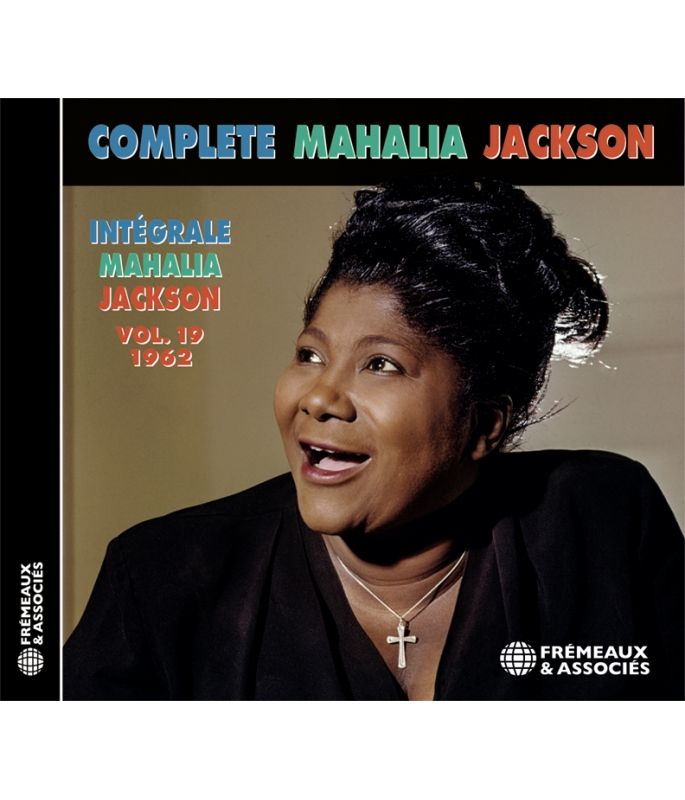
- -
- -
“A voice like here comes along once in a millenium.”
Martin Luther KING
The complete Mahalia Jackson recordings (presented chronologically as in the Sister Rosetta Tharpe series) reveal a personality who will remain one of the greatest-ever Gospel artists, a singer who lled 20th century Afro-American culture with inspiration. The source of this vital music is the collection of Jean Buzelin, the author of this anthology, together with the aid of collectors of Mahalia Jackson’s work; all these recordings have been restored with the best analog transfers and most sophisticated technology available, to avoid any alteration of the original sound.
Patrick FRÉMEAUX & Claude COLOMBINI
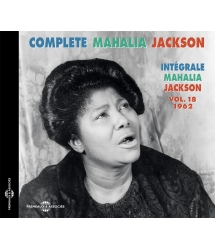
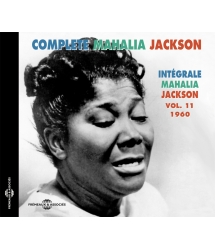
COMPLETE MAHALIA JACKSON VOL 11 - 1960
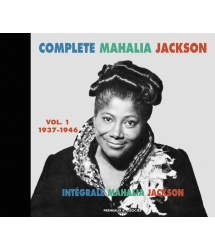
1937-1946
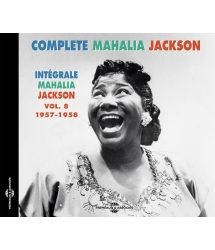
1957 - 1958




-
PisteTitleMain artistAutorDurationRegistered in
-
1Lord, Don't Let Me FailMahalia JacksonMargaret Aikens00:03:112021
-
2I Couldn't Keep It to MyselfMahalia JacksonAlex Bradford00:05:592021
-
3It's in My HeartMahalia JacksonArthur Slater00:03:532021
-
4It Took a MiracleMahalia JacksonJohn Peterson00:04:302021
-
5No Other Help I KnowMahalia JacksonRoberta Martin00:04:152021
-
6Without God I Could Do NothingMahalia JacksonBeatrice Brown00:04:422021
-
7Joy to the WorldMahalia JacksonIsaak Watts00:02:262021
-
8O Little Town of BethlehemMahalia JacksonLewis Redner00:03:582021
-
9O Come, All Ye Faithful (Adeste Fideles)Mahalia JacksonJohn Reading00:04:462021
-
10What Can I GiveMahalia JacksonMichael Smith00:05:212021
-
11Go Tell It on the MountainMahalia JacksonAir Traditonnel00:02:482021
-
12Silent Night, Holy NightMahalia JacksonJoseph Mohr00:05:062021
-
13Hark! The Herald Angels SingMahalia JacksonCharles Wesley00:03:392021
-
14Christmas Comes to Us All Once a YearMahalia JacksonAlfred Arquilla00:02:342021
-
15A Star Stood Still (Song of the Nativity)Mahalia JacksonJohnny Broderick00:04:122021
-
16Sweet Little Jesus BoyMahalia JacksonRobert Mac Gimsey00:05:162021
CLICK TO DOWNLOAD THE BOOKLET
COMPLETE MAHALIA JACKSON - VOL. 19 – 1962
By Jean Buzelin
The opening six titles of this further volume of our Complete Mahalia Jackson complete the recording session on 23 March 1962, the first five titles of which closed our preceding Volume 18, all of which appeared on the album “Make a Joyful Noise Unto the Lord”.
Backed by an excellent group led by pianist Edward C. Robinson, one of her regular musicians, plus the presence on most of the titles by a mixed choir conducted by Thurston Frazier, the singer is really on form in an environment that suited her perfectly.
These six titles are all Gospel songs, two of which had been popularized by other groups and singers, notably James Cleveland: It’s In My Heart, a Gospel waltz by Arthur Slater and It Took A Miracle, a 1948 hymn by the prolific white evangelist composer John W. Peterson. The others, rarer or more recent: Without God I Could Do Nothing, another Gospel waltz, composed by Beatrice Brown in 1959, had already been recorded by the Raymond Rasbury Singers and a few months later by the Black Home Choir of the Greatest Harvest Baptist Church. Early in 1963 the upbeat I Couldn’t Keep It To Myself by Alex Bradford was recorded by a children’s sextet, the Gospel Chords. Mahalia appears to have been the first to interpret Lord, Don’t Let Me Fail, in a new arrangement by Kenneth Woods and Margaret Aikens. Finally, No Other Help I Know, in triple time typical of composer Roberta Martin, was one of the last by the Roberta Martin Singers1.
A complete version of this album, a little off the beaten track, was apparently never reissued by Columbia on CD2 and was, unfortunately overshadowed by “Great Songs of Love and Faith”3 and “Songs for Christmas” recorded a few months later. However, for some time there had been a renewed interest in Gospel music. The most popular black music in the early 60s, whether funky jazz or hard bop, and soul music had echoes of its religious roots, and numerous Gospel groups and singers were appearing in secular venues, theaters and night clubs, toured Europe and attracted a new audience. “Black Nativity”, a show written by Afro-American poet Langston Hughes, was based on Negro spirituals and traditional Christmas songs. Starring Marion Williams and The Stars of Faith, Professor Alex Bradford (a huge star at the time) and his Bradford Singers and the vocalist Princess Stewart, after premiering in New York in 1961, the show toured throughout Europe in 1963.
Was it due to the brilliant success of Black Nativity or simply because every great popular singer at the time was expected to produce a Christmas album that Mahalia gave in to public demand? After all, a few years before, she had performed several Christmas songs on TV4 and had already recorded the album “Sweet Little Jesus Boy”5. A favorite of producer Irving Townsend and probably of Mahalia herself, the young and gifted Johnny Williams was again entrusted with the musical arrangements. He emphasized the choral parts, leaving the instrumental accompaniment more in the background. The chosen repertoire deliberately included nothing new as it had to please a wide audience. Mahalia reprised six songs (tracks 7,8,9,11,12,16) which had featured on the 1955 record, and four others filmed the previous year at the end of her “Mahalia Jackson Sings” (tracks 9,12,15,16 with a simple piano/organ accompaniment which makes for an interesting comparison)4. Only Go Tell It On The Mountain is an authentic Negro spiritual, although Robert McGimsey’s Sweet Little Jesus Boy does have Gospel echoes. While most of the remaining titles may not be traditional Afro-American, they had long been appropriated by black groups and vocalists: Joy To The World and Silent Night had been recorded countless times, less often Oh Little Town Of Bethlehem (Marion Williams), Oh Come All Ye Faithful (Marie Knight), Hark! (James Cleveland, the Blind Boys of Alabama and the Ward Singers among others). Three were included in “Black Nativity”: Joy To The World, Oh Come All Ye Faithful and Sweet Little Jesus Boy. Mahalia seems to have been the first Gospel singer to record What Can I Give, Christmas comes To Us and A Star Stood Still (already in 1956)6. However, whether truly Afro-American or not, this album alongside “Great Song of Love and Faith” remains an important part of American musical history on which Mahalia is in superb voice. From the 33r.p.m. album “Silent Night – Songs for Christmas”, which came on the market on 30 November 1962 (just in time for Christmas!) a now rare 45 was issued with Go Tell It On The Mountain (which became a hit) backed by Joy To The World.
During this period Mahalia also participated in the National Baptist Convention in September and then, when a cultural exchange was being considered with Russia, President Kennedy invited her to take part in the Emancipation Centenary celebrations on 22 September. This ceremony aroused mixed feelings and was boycotted by some organizations including Martin Luther King’s SCLS (Southern Christian Leadership Conference). However, Mahalia sang The Star-Spangled Banner to the delight of Kennedy. A few days later 3,500 guests were at the Embassy Room in Los Angeles to pay homage to Nat King Cole and Mahalia was greeted with a standing ovation. She had wanted to sing The Lord’s Prayer but the organizers objected so she chose Elijah Rock instead. On 10 October she sang yet again at the Philharmonic Hall in New York.
European law prevents us publishing recordings of Mahalia Jackson after 1962. So this 19th CD will probably bring to an end our Complete Mahalia Jackson which, with the encouragement of Patrick Frémeaux began in 1998, unless the discovery of unissued tracks enables us to produce a 20th bonus CD.
Columbia issued ten albums by Mahalia between 1963 and 1969:
- “Mahalia Jackson’s Greatest Hits” (1963), with Edward Robinson (piano), Billy Preston and Albert Goodson (organ)
- “Let’s Pray Together” (1963) with We Shall Overcome ; choir and orchestra led by Marty Paich
- “Garden of Prayer” (1965/66)
- “Mahalia !” (1965)
- “My Faith” (1965), with an orchestra led by Richard Hazard
- “Mahalia Jackson in Concert” (1967), at the Philharmonic Hall, with Edward Robinson (piano) and Charles Clemcy (organ)
- “A Mighty Fortress” (1968), with an orchestra led by Marty Paich, and the last appearance of Mildred Falls
- “Christmas with Mahalia” (1968), third album of Christmas songs
- “Mahalia ! Right Out of the Church” (1969)
- “What the World Needs Now” (1969), with Abraham, Martin and John, orchestra and choir led by H.B. Barnum
+ one LP Caedmon “The Life of Sing About”.
Plus numerous other compilations.
Several other events marked the life of the singer after 1962: her participation in the Washington march7 and the assassination of John Kennedy several months later. In 1964 she again toured Europe, including a London concert on 5 September filmed for TV, with Mildred Falls (piano), Edward Robinson (Organ), Fitzroy Coleman (guitar) and Rupert Nurse (double bass).
26 March 1967, an exceptional “Easter Sunday” concert (later issued on disc) took place in the Lincoln Center, attended by Martin Luther King, featuring a new organist Charles Clemcy and, as Mildred Falls was suffering from arthritis, Edward Robinson on piano. This was the era of the civil rights movement, racial upheaval, the Vietnam War protests – all of which Mahalia was engaged in. Following the assassination of Martin Luther King on 4 April 1968, Mahalia sang Take My Hand Precious Lord at his funeral. Then 6 June saw the assassination of Robert Kennedy. A month later Mahalia appeared at the Jazz Festival in Antibes-Juan-les-Pins8. Another European tour in 1969 included London, Stockholm, Paris, Berlin, Hamburg, Zurich and Vienna.
A constant stream of recitals, concerts, TV show etc. exhausted her, further complicated by her diabetes and heart problems. In spite of this, she managed to give her first concerts in Japan and India, then on to Sweden, Norway, Palermo, Tel-Aviv... In October she flew to Germany but, soon after her arrival, was hospitalized and flown back to Chicago on 23 October. She died of a heart attack on 21 January 1972, aged 60.
Her funeral took place in her church in Chicago, the Greater Salem Baptist Church. The mayor of Chicago Richard R. Daley and Martin Luther King’s widow Coretta were present. Sammy Davis Jr., Ella Fitzgerald, Gertrude and Clara Ward, Sallie Martin, Thomas Dorsey, Robert Anderson, J. Robert Bradley, Delois Barrett Campbell also sang or spoke in homage to the greatest Gospel singer ever. Aretha Franklin sang Precious Lord, thus taking up the baton and ensuring that Mahalia’s legacy would never be forgotten9.
Adapted from the French text of Jean Buzelin
by Joyce Waterhouse
© Frémeaux & Associés 2021
Jean Buzelin is the author of Negro Spirituals et Gospel Songs, Chants d’espoir et de liberté (Ed. by Layeur/Notre Histoire publ. Paris 1998) ; he collaborated on the Gospel Discography by Cedric J. Hayes & Robert Laughton (sections on Mahalia Jackson, Sister Rosetta Tharpe, Golden Gate Quartet etc.).
Notes :
(1) See Roberta Martin Singers (3 CD FA5737)
(2) Only a few titles appear in various compilations
(3) See Complete Mahalia Jackson Vol.18 (FA1328)
(4) See Complete Mahalia Jackson Vol.17 Mahalia Sings Part 4 (FA1327)
(5) See Complete Mahalia Jackson Vol.6 (FA1316)
(6) See Complete Mahalia Jackson Vol.7 (FA1317)
(7) See Complete Mahalia Jackson Vol.12 (FA1322)
(8) Mahalia Jackson, Live in Antibes 1968 (Esoldun FCD 122) with E. Robinson and C. Clemcy; excerpts of the 21 and 25 July concerts recorded by ORTF
(9) A second funeral service took place in her birthplace New Orleans with the participation of Bessie Griffin, who was also born there
Works consulted:
Laurraine Gorreau: Mahalia (Lion Pub. UK 1976 – 2nd edition).
Mahalia Jackson with Evan McLeod Wylie, Movin’ on up (Hawthorn Books, NY 1966)
Jules Schwerin: Got To Tell It: Mahalia Jackson Queen of Gospel (O.U.P, NY 1992).
Anthony Heilbut, The Gospel Sound (Limelight ED., NY 1971 – 4th edition 1992)
Cedric J. Hayes & Robert Laughton, Gospel Discography 1943-1970 (Eyeball Productions Inc., 2007)
Photos & Collections : Jean Buzelin, CBS, X (D.R.)
1. LORD, DON’T LET ME FAIL (Trad. - arr. K. Woods Jr - M. Aikens)
2. I COULDN’T KEEP IT TO MYSELF (A. Bradford)
3. IT’S IN MY HEART (A. Slater)
4. IT TOOK A MIRACLE (J. Peterson)
5. NO OTHER HELP I KNOW (R. Martin)
6. WITHOUT GOD I COULD DO NOTHING (B. Brown)
7. JOY TO THE WORLD! (L. Mason - I. Watts) HCO 70872
8. O LITTLE TOWN OF BETHLEHEM (P. Brooks - L. Redner) HCO 70873
9. O COME, ALL YE FAITHFUL (ADESTE FIDELES) (J.F. Wade - J. Reading - F. Oakeley) HCO 70874
10. WHAT CAN I GIVE (M. Smith) HCO 70875
11. GO TELL IT ON THE MOUNTAIN (Trad.) HCO 70876
12. SILENT NIGHT, HOLY NIGHT (F.X. Grüber - J. Mohr) HCO 70878
13. HARK! THE HERALD ANGELS SING (F. Mendelssohn - C. Wesley) HCO 70877
14. CHRISTMAS COMES TO US ALL ONCE A YEAR (F. Arquilla) HCO 70879
15. A STAR STOOD STILL (SONG OF THE NATIVITY) (B. Ruth - J. Broderick) HCO 70880
16. SWEET LITTLE JESUS BOY (R. McGimsey) HCO 70881
Mahalia Jackson (vocal), with:
(1-6) Orchestra cond. by Edward Robinson; Edward C. Robinson (p), Albert A. Goodson (org), Al Hendrikson (g), Joe Mondragon (b), Sheldon “Shelly” Manne, or Johnny Williams on some tracks (dm); Chorus under the direction of Thurston Frazier (except 1, 4). Hollywood, CA, 22/03/1962.
(7-12) Orchestra & chorus cond. by Johnny Williams. Hollywood, 24/07/1962.
(13-16) Same. Hollywood, 25/07/1962.


